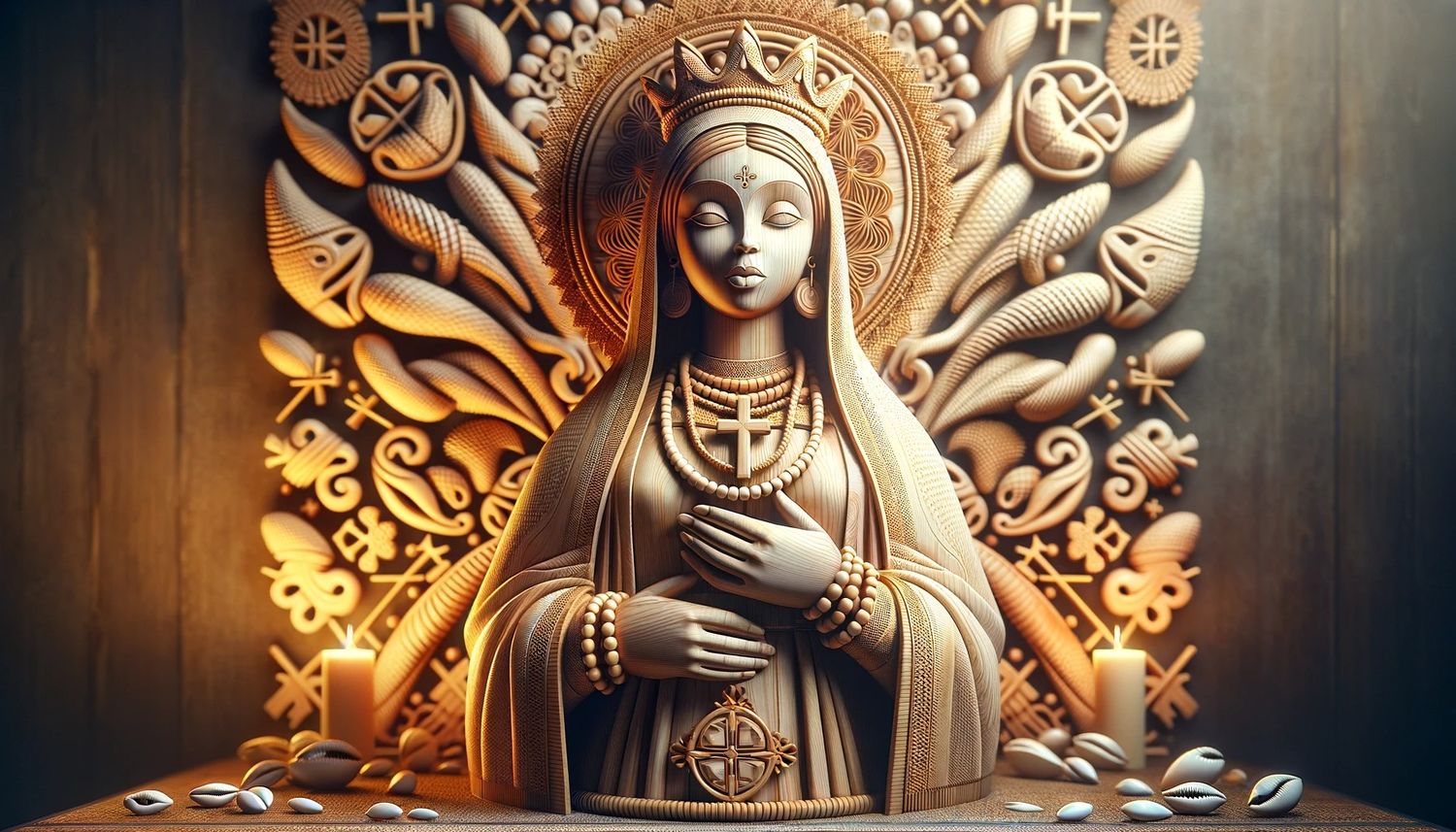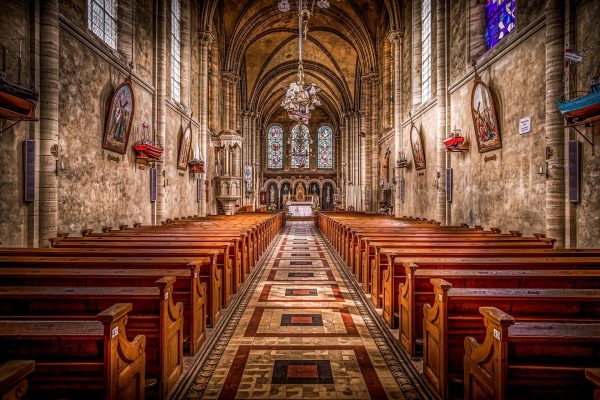Home>Theology and Spirituality>Which Religions Have Communion


Theology and Spirituality
Which Religions Have Communion
Published: February 25, 2024
Peter Smith, Editorial Director at Christian.net, combines deep insights into faith, politics, and culture to lead content creation that resonates widely. Awarded for his contributions to religious discourse, he previously headed a major organization for religious communicators, enhancing dialogue on faith's societal impacts.
Discover the significance of communion in various religions and its role in theology and spirituality. Explore the practices and beliefs surrounding communion.
(Many of the links in this article redirect to a specific reviewed product. Your purchase of these products through affiliate links helps to generate commission for Christian.net, at no extra cost. Learn more)
Table of Contents
Christianity
Christianity, one of the world's largest religions, encompasses a diverse range of traditions and practices. Central to the Christian faith is the concept of communion, a sacred ritual that holds deep spiritual significance for believers. Communion, also known as the Eucharist or the Lord's Supper, is a symbolic reenactment of the Last Supper, where Jesus shared bread and wine with his disciples.
In the Catholic tradition, communion is a fundamental sacrament, often referred to as the "source and summit" of the Christian life. During the Mass, believers partake in the Eucharist, consuming consecrated bread and wine, which are believed to transform into the body and blood of Christ. This act of communion is a profound expression of unity with Christ and fellow believers, representing spiritual nourishment and the forgiveness of sins.
In Protestantism, communion is observed in various forms, including the Lord's Supper and the Holy Communion. While interpretations of the ritual differ among denominations, the underlying significance remains rooted in the remembrance of Christ's sacrifice and the spiritual bond within the community of believers. Some Protestant churches practice open communion, inviting all baptized Christians to participate, while others maintain closed communion, reserving the ritual for members of their specific faith community.
Within Eastern Orthodoxy, communion, or the Divine Liturgy, holds immense reverence as a mystical union with the divine. The Eucharist is viewed as the pinnacle of worship, embodying the presence of Christ and the transformative power of the Holy Spirit. The act of receiving communion is a deeply personal and communal experience, fostering spiritual growth and a profound connection to the teachings of the early Church fathers.
In Anglicanism, communion, often referred to as the Holy Eucharist, is celebrated with a rich blend of liturgical traditions and theological perspectives. The Eucharistic celebration serves as a focal point of worship, emphasizing the real presence of Christ in the consecrated elements and the communal sharing of spiritual nourishment.
The significance of communion varies across Christian denominations, yet its essence remains rooted in the spiritual unity, remembrance of Christ's sacrifice, and the profound connection to the divine and fellow believers.
Read more: Which Religion Practices Confession?
Catholicism
Catholicism, with its rich tapestry of traditions and sacraments, places profound emphasis on the sacred ritual of communion. At the heart of Catholic faith, communion, also known as the Eucharist, holds deep spiritual significance for believers. During the celebration of the Mass, the Eucharist is central, representing the reenactment of the Last Supper, where Jesus shared bread and wine with his disciples.
In the Catholic tradition, communion is regarded as one of the seven sacraments, often described as the "source and summit" of the Christian life. The ritual of communion involves the consecration of bread and wine by a priest, transforming them into the body and blood of Christ through the process of transubstantiation. This profound belief in the real presence of Christ in the Eucharist underscores the spiritual significance of communion for Catholics.
Partaking in communion is a deeply reverent act for Catholics, symbolizing their unity with Christ and fellow believers. It is a moment of spiritual nourishment and a tangible expression of the forgiveness of sins. The act of receiving the Eucharist is accompanied by prayers, rituals, and a sense of awe, as believers approach the sacred elements with humility and devotion.
The Catholic Church upholds the practice of regular communion, encouraging believers to receive the Eucharist during Mass, especially on Sundays and holy days of obligation. The significance of communion extends beyond the individual, fostering a sense of communal unity and spiritual solidarity among the faithful.
Furthermore, the Catholic Church places great emphasis on the preparation for communion, particularly through the sacrament of reconciliation, also known as confession. This sacramental practice underscores the importance of spiritual purity and reconciliation with God and the community before partaking in the Eucharist.
In essence, within Catholicism, communion stands as a profound sacramental expression of the believer's union with Christ, the community of faith, and the living tradition of the Church. It is a sacred ritual that encapsulates the core tenets of Catholic faith and serves as a source of spiritual nourishment and renewal for the faithful.
Protestantism
Protestantism, encompassing a diverse array of denominations and theological perspectives, holds communion as a central and deeply meaningful ritual within its worship practices. The observance of communion, also known as the Lord's Supper or the Holy Communion, varies across Protestant traditions, reflecting a spectrum of beliefs and practices rooted in the Reformation era.
In Protestantism, the ritual of communion is imbued with rich symbolism, serving as a poignant reenactment of the Last Supper and a profound expression of the believer's faith. While interpretations of the Eucharist differ among Protestant denominations, the underlying significance remains anchored in the remembrance of Christ's sacrificial death and the spiritual unity of the community of believers.
Within the Protestant tradition, communion is often viewed as a symbolic memorial, emphasizing the spiritual significance of Christ's sacrifice and the believer's personal relationship with God. The act of partaking in the Eucharist serves as a tangible expression of faith and a communal affirmation of the redemptive work of Christ.
Various Protestant denominations approach communion with distinct theological perspectives. For example, Lutheran traditions emphasize the real presence of Christ in the Eucharist, affirming the belief in consubstantiation, where the body and blood of Christ coexist with the consecrated bread and wine. This theological stance underscores the profound nature of communion as a means of encountering the living Christ in the sacramental elements.
In contrast, Reformed traditions, including Presbyterian and Reformed churches, often emphasize the symbolic nature of communion, highlighting its role as a memorial of Christ's sacrifice and a communal expression of faith. The act of partaking in the Lord's Supper serves as a visible sign of the believer's union with Christ and fellow members of the faith community.
Furthermore, in the Methodist tradition, communion, also known as the Holy Communion or the Lord's Supper, holds deep spiritual significance as a means of grace. The act of receiving the Eucharist is viewed as a transformative encounter with the living Christ, fostering spiritual nourishment and renewal for the believer.
In essence, within Protestantism, communion stands as a sacred ritual that embodies the diverse theological perspectives and spiritual expressions of the faith. It serves as a unifying practice that underscores the central tenets of Christian belief while fostering a sense of communal worship and spiritual solidarity among believers.
Eastern Orthodoxy
Eastern Orthodoxy, with its rich tapestry of liturgical traditions and theological depth, holds communion, also known as the Divine Liturgy, in profound reverence. The Eucharist, central to the Eastern Orthodox faith, is viewed as the pinnacle of worship, embodying the mystical union with the divine and the transformative power of the Holy Spirit.
In the Eastern Orthodox tradition, the celebration of the Divine Liturgy is a sacred and awe-inspiring experience, steeped in ancient rituals and profound symbolism. The Eucharist is regarded as the focal point of communal worship, where the faithful gather to partake in the mystical banquet, encountering the real presence of Christ in the consecrated elements of bread and wine.
The act of receiving communion in Eastern Orthodoxy is imbued with deep spiritual significance, representing the believer's union with Christ and the community of faith. The faithful approach the Eucharist with reverence and humility, acknowledging the mystery of the sacrament and the transformative power it holds within the spiritual life.
Furthermore, the Eastern Orthodox Church places great emphasis on the preparation for communion, underscoring the importance of spiritual purity and inner readiness to partake in the Eucharist. The sacrament of confession, or the rite of reconciliation, plays a pivotal role in the spiritual journey toward communion, allowing believers to seek forgiveness, reconciliation, and spiritual healing before approaching the sacred banquet.
The Divine Liturgy in Eastern Orthodoxy is characterized by intricate prayers, hymns, and liturgical gestures, creating a sense of sacred time and space where the earthly and heavenly realms converge. The Eucharistic celebration is a profound expression of the Church's living tradition, rooted in the teachings of the early Church fathers and the apostolic faith.
Moreover, the act of receiving communion in Eastern Orthodoxy fosters spiritual growth, nourishment, and a deepening of the believer's union with Christ and the community of faith. It is a transformative encounter with the divine, where the faithful are invited to partake in the heavenly banquet and experience the mystery of Christ's presence in the Eucharist.
In essence, within Eastern Orthodoxy, communion stands as a sacred and transformative sacrament, embodying the mystical union with the divine and the communal expression of faith. It serves as the spiritual nourishment and the pinnacle of worship, fostering a profound connection to the living tradition of the Church and the transformative power of the Eucharist.
Anglicanism
Anglicanism, with its diverse theological perspectives and rich liturgical heritage, holds communion, often referred to as the Holy Eucharist, as a central and deeply significant sacrament within its worship tradition. The celebration of the Eucharist in Anglicanism reflects a blend of ancient liturgical practices and theological diversity, encompassing a spectrum of beliefs and expressions of faith.
In Anglican tradition, the Eucharist serves as a focal point of communal worship, embodying the real presence of Christ in the consecrated elements of bread and wine. The act of receiving communion is viewed as a sacred encounter with the living Christ, fostering spiritual nourishment and renewal for the faithful. The Anglican approach to the Eucharist reflects a balance between reverence for tradition and openness to diverse theological interpretations, allowing for a rich tapestry of worship practices within the Anglican Communion.
The significance of communion in Anglicanism extends beyond the ritual itself, emphasizing the communal aspect of faith and the unity of believers in Christ. The Eucharist serves as a visible sign of the believer's union with Christ and fellow members of the faith community, fostering a sense of spiritual solidarity and shared worship experience. The act of partaking in the Holy Eucharist underscores the Anglican commitment to the sacramental life of the Church and the ongoing renewal of faith within the worshipping community.
Furthermore, the Anglican tradition embraces a diversity of liturgical expressions and theological perspectives regarding the nature of the Eucharist. While some Anglican churches emphasize the real presence of Christ in the Eucharist, akin to Catholic and Orthodox traditions, others hold a more symbolic view, highlighting the Eucharist as a memorial of Christ's sacrifice and a communal expression of faith. This theological diversity within Anglicanism reflects the inclusive nature of the tradition, allowing for a range of spiritual experiences and expressions of faith within the worshiping community.
In essence, within Anglicanism, communion stands as a sacred and unifying sacrament, embodying the diverse theological perspectives and liturgical traditions of the faith. It serves as a tangible expression of the believer's union with Christ and the community of faith, fostering a sense of communal worship and spiritual solidarity among Anglicans worldwide.
Read more: Which Religion Is Most Like Catholicism
Mormonism
Mormonism, formally known as The Church of Jesus Christ of Latter-day Saints, holds a distinctive perspective on communion within its religious practices. Central to Mormon belief is the sacrament, a ritual that parallels the concept of communion in other Christian traditions. The sacrament is a sacred ordinance that takes place during weekly worship services, signifying the partaking of bread and water in remembrance of the body and blood of Jesus Christ.
In the context of Mormonism, the sacrament holds profound spiritual significance, serving as a solemn and reverent act of worship. The ordinance is conducted by priesthood holders, who bless and administer the bread and water to the congregation. The act of partaking in the sacrament is viewed as a symbolic reenactment of the Last Supper, emphasizing the believer's commitment to follow Christ and remember His atoning sacrifice.
The sacrament in Mormonism is a communal expression of faith and unity, inviting members to reflect on their relationship with God and their fellow believers. It serves as a moment of introspection and spiritual renewal, allowing individuals to seek forgiveness, recommit to their faith, and strive for personal growth. The act of partaking in the sacrament fosters a sense of spiritual communion and solidarity within the Mormon community, reinforcing the shared values and beliefs that bind members together.
Furthermore, the preparation for the sacrament holds great significance within Mormonism. Members are encouraged to approach the ordinance with a spirit of humility, repentance, and gratitude. The sacrament meeting, where the ordinance takes place, provides a sacred space for individuals to seek spiritual nourishment, receive counsel, and strengthen their commitment to living the teachings of Jesus Christ.
The sacrament serves as a pivotal aspect of worship within Mormonism, embodying the principles of remembrance, renewal, and spiritual communion. It stands as a tangible expression of the believer's devotion to Christ and the shared bond of faith within the Latter-day Saint community. The sacrament holds a central place in the religious life of Mormons, serving as a source of spiritual nourishment and a reaffirmation of their commitment to the gospel of Jesus Christ.
Jehovah's Witnesses
Jehovah's Witnesses, known for their distinctive approach to faith and worship, hold a unique perspective on the concept of communion within their religious practices. For Jehovah's Witnesses, the observance of communion, often referred to as the Memorial, holds profound spiritual significance and serves as a central feature of their annual religious calendar.
The Memorial, observed once a year on the evening of Nisan 14, according to the Jewish calendar, corresponds to the date of the Last Supper as described in the Bible. This solemn occasion is marked by a special commemorative service, where Jehovah's Witnesses gather to remember the death of Jesus Christ and the significance of his sacrificial act. The Memorial is regarded as a deeply reverent and reflective event, emphasizing the fundamental teachings of Christ and the redemptive purpose of his death.
During the Memorial, Jehovah's Witnesses partake in unleavened bread and red wine, symbolizing the body and blood of Christ, in remembrance of the Last Supper. However, it is important to note that only a select group of anointed Jehovah's Witnesses, who believe they are called to heavenly life, partake in the emblems, while the majority of attendees respectfully observe the ritual without partaking. This distinctive practice reflects the unique theological beliefs of Jehovah's Witnesses regarding the heavenly calling of a limited number of believers.
The Memorial holds a central place in the religious life of Jehovah's Witnesses, serving as a poignant reminder of Christ's sacrificial death and the hope of salvation through his atoning sacrifice. The occasion fosters a sense of spiritual unity and solidarity within the global community of Jehovah's Witnesses, reinforcing their shared commitment to the teachings of Jesus Christ and the principles of their faith.
Furthermore, the Memorial underscores the distinctive theological perspectives of Jehovah's Witnesses regarding the significance of Christ's death and the hope for a future paradise on earth. The occasion serves as a powerful expression of their faith and a reaffirmation of their dedication to living in accordance with the teachings of the Bible.
In essence, within the religious practices of Jehovah's Witnesses, the Memorial stands as a deeply meaningful and unifying observance, embodying their unique theological beliefs and the shared bond of faith within the global community of believers. It serves as a tangible expression of their devotion to Christ and the fundamental principles of their faith, fostering a sense of spiritual communion and solidarity among Jehovah's Witnesses worldwide.
Buddhism
Buddhism, a profound and diverse spiritual tradition, offers a unique perspective on the concept of communion within its religious framework. Central to Buddhist practice is the ritual of offering, known as "dana," which holds deep spiritual significance for practitioners. While Buddhism does not have a direct equivalent to the traditional concept of communion found in other religious traditions, the act of dana embodies the spirit of generosity, compassion, and interconnectedness that aligns with the principles of communal sharing and spiritual unity.
In the Buddhist context, the practice of dana involves the act of giving, whether it be material offerings, acts of service, or the sharing of knowledge and wisdom. This practice is rooted in the fundamental Buddhist teachings on compassion, selflessness, and the interconnected nature of all beings. Through the act of dana, practitioners cultivate a spirit of generosity and selflessness, recognizing the inherent interconnectedness of all life and the importance of supporting one another on the path to spiritual awakening.
Furthermore, within certain Buddhist traditions, communal gatherings and rituals provide opportunities for practitioners to come together in shared practice and spiritual fellowship. While these gatherings may not align directly with the traditional concept of communion, they serve as occasions for collective meditation, chanting of sacred texts, and the sharing of teachings by ordained monastics. These communal practices foster a sense of spiritual solidarity and shared devotion to the Buddhist path, creating a space for practitioners to support and uplift one another in their spiritual journey.
Moreover, the act of sharing food, known as "sangha-dana," within the monastic community holds particular significance in certain Buddhist traditions. This practice involves lay supporters offering alms to monastics, symbolizing the interdependence between the monastic sangha and the lay community. The act of offering food to monastics not only sustains the monastic community but also allows lay practitioners to participate in the merit-making process, fostering a sense of communal support and spiritual connection.
In essence, while Buddhism may not have a direct parallel to the traditional concept of communion found in other religious traditions, the practices of dana, communal gatherings, and the act of sharing food within the Buddhist context embody the principles of communal sharing, spiritual unity, and the interconnected nature of all beings. These practices serve as tangible expressions of the Buddhist commitment to generosity, compassion, and the cultivation of a harmonious and supportive spiritual community.
Hinduism
Hinduism, one of the world's oldest and most diverse religious traditions, offers a multifaceted perspective on communal worship and spiritual unity. Central to Hindu religious practice is the concept of "prasad," which embodies the essence of communion within the Hindu context. Prasad, often in the form of food or sacred offerings, holds deep spiritual significance for practitioners and serves as a tangible expression of divine grace and communal sharing.
In Hindu temples and sacred gatherings, the offering and distribution of prasad symbolize the divine benevolence and the interconnectedness of the worshiping community. Devotees partake in prasad as a sacred act of receiving blessings and spiritual nourishment, fostering a sense of unity and shared devotion to the divine. The act of sharing prasad creates a communal bond among worshippers, transcending social barriers and fostering a spirit of inclusivity and mutual respect within the religious community.
Furthermore, the practice of "bhajan" and "kirtan," devotional singing and chanting, serves as a communal expression of spiritual unity within Hinduism. During these devotional gatherings, participants engage in collective singing of hymns and chants, creating a harmonious and uplifting atmosphere that fosters a sense of shared devotion and spiritual connection. The rhythmic recitation of sacred mantras and hymns unites the worshiping community in a collective expression of reverence and devotion to the divine.
In addition, Hindu festivals and religious observances provide opportunities for communal worship and spiritual fellowship. During festivals such as Diwali, Holi, and Navaratri, devotees come together to celebrate and participate in collective rituals, prayers, and cultural performances. These festive gatherings create a sense of communal joy and spiritual solidarity, allowing worshippers to connect with the divine and each other in a spirit of shared celebration and devotion.
Moreover, the concept of "satsang," or spiritual fellowship, holds great significance within Hinduism. Satsang gatherings bring together seekers and devotees to engage in spiritual discourse, meditation, and the sharing of sacred teachings. These gatherings foster a sense of spiritual communion and mutual support, providing a space for individuals to deepen their spiritual practice and seek guidance from spiritual mentors and fellow practitioners.
In essence, within Hinduism, the practices of prasad, devotional singing, festival celebrations, and satsang embody the principles of communal worship, spiritual unity, and the interconnected nature of the worshiping community. These practices serve as tangible expressions of the Hindu commitment to shared devotion, inclusivity, and the cultivation of a harmonious and supportive spiritual community.
Read more: In The Catholic Religion, What Is Communion
Sikhism
Sikhism, a vibrant and inclusive religious tradition, holds a profound perspective on communal worship and spiritual unity. At the heart of Sikh religious practice is the concept of "Langar," a communal kitchen and dining hall where free meals are served to all visitors, regardless of their background or beliefs. The institution of Langar embodies the core Sikh principles of equality, community service, and the recognition of the divine presence in all individuals.
In Sikh gurdwaras, or places of worship, the Langar is a central feature, symbolizing the spirit of seva, or selfless service, and the practice of sharing with others. Devotees and visitors, irrespective of their social status, ethnicity, or religion, come together to partake in the Langar, sitting side by side as equals. This communal dining experience fosters a sense of unity and shared humanity, transcending societal divisions and reinforcing the fundamental Sikh belief in the equality of all human beings.
The act of serving and partaking in the Langar represents a tangible expression of the Sikh commitment to selflessness, compassion, and the welfare of others. Volunteers, known as "sevadars," selflessly prepare, serve, and clean the Langar, embodying the spirit of humility and service to the community. The Langar serves as a powerful symbol of communal sharing and spiritual unity, reflecting the Sikh emphasis on the importance of selfless action and the cultivation of a caring and inclusive community.
Furthermore, the practice of "Kirtan," the devotional singing of hymns from the Guru Granth Sahib, the Sikh holy scripture, serves as a communal expression of spiritual unity within Sikhism. During Kirtan, congregants join in collective singing and recitation of sacred hymns, creating a harmonious and uplifting atmosphere that fosters a sense of shared devotion and spiritual connection. The rhythmic recitation of Gurbani, the divine compositions contained in the Guru Granth Sahib, unites the worshiping community in a collective expression of reverence and devotion to the divine.
In addition, Sikh festivals and religious observances provide opportunities for communal worship and spiritual fellowship. During celebrations such as Vaisakhi and Gurpurab, devotees come together to participate in collective prayers, processions, and community service activities. These festive gatherings create a sense of communal joy and spiritual solidarity, allowing worshippers to connect with the divine and each other in a spirit of shared celebration and devotion.
In essence, within Sikhism, the practices of Langar, Kirtan, festival celebrations, and community service embody the principles of communal worship, spiritual unity, and the interconnected nature of the worshiping community. These practices serve as tangible expressions of the Sikh commitment to shared devotion, inclusivity, and the cultivation of a harmonious and supportive spiritual community.













